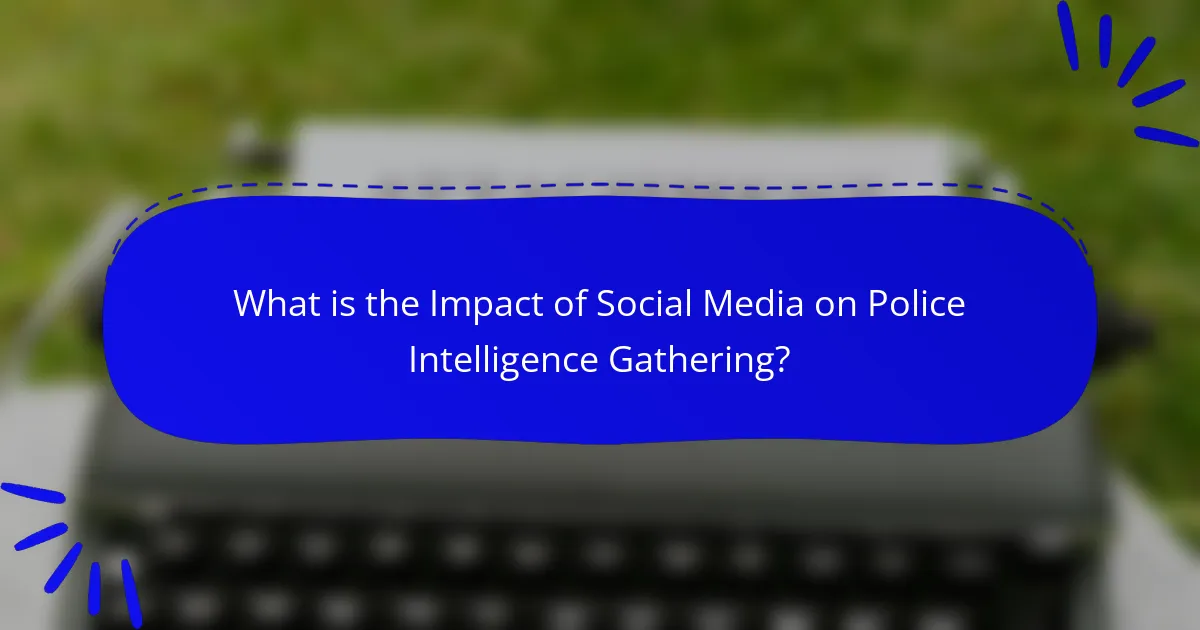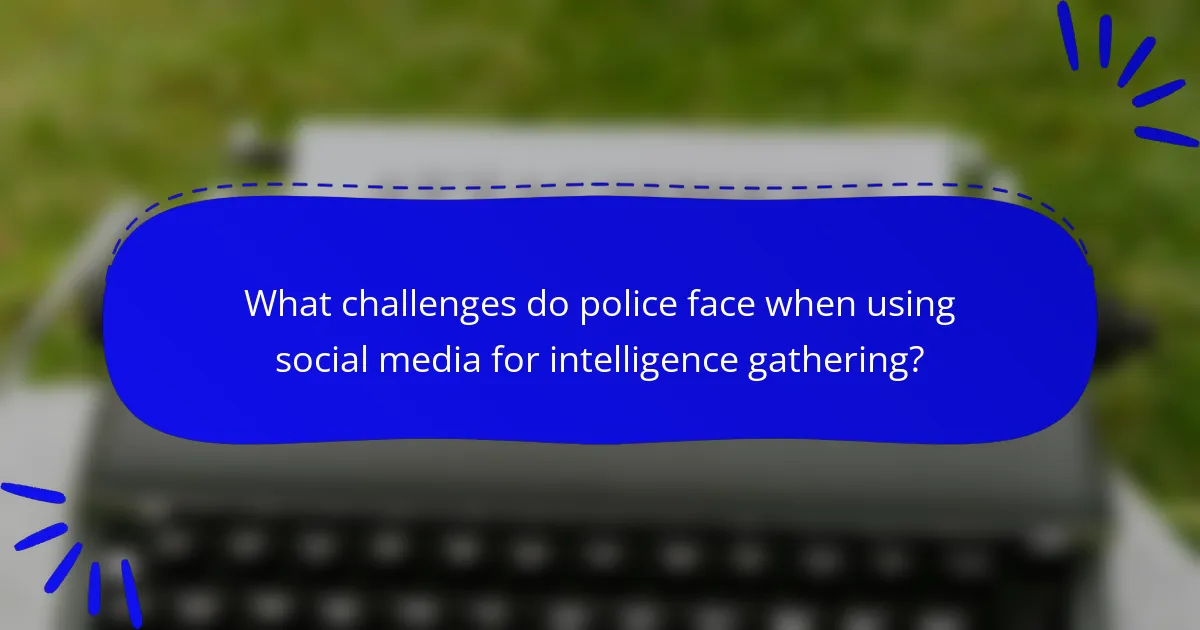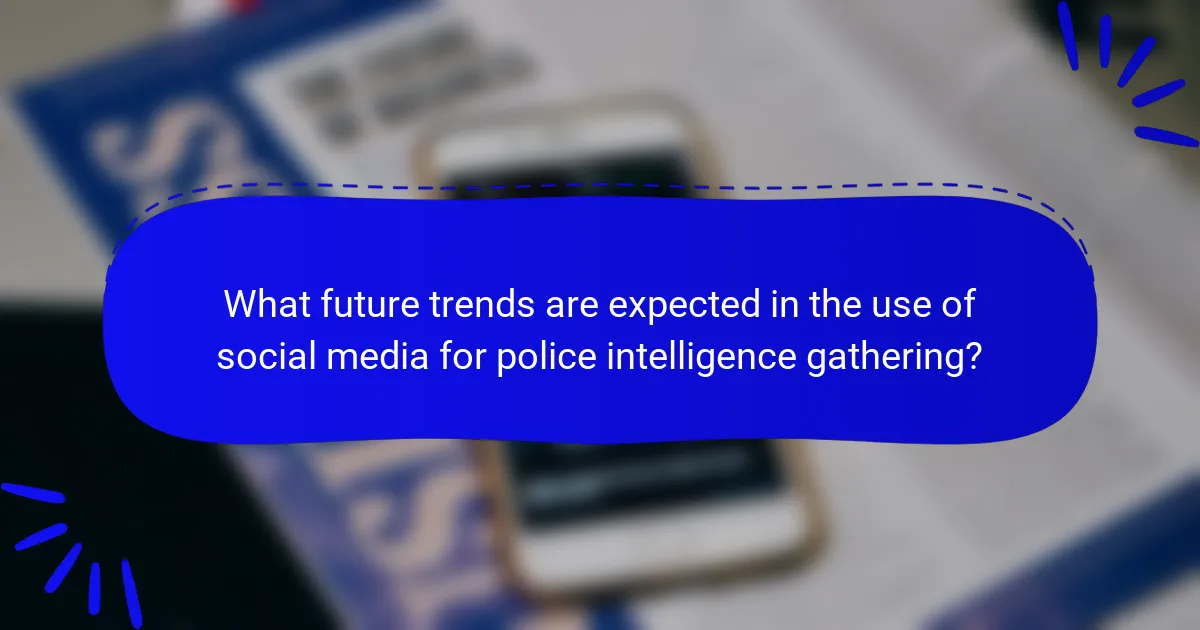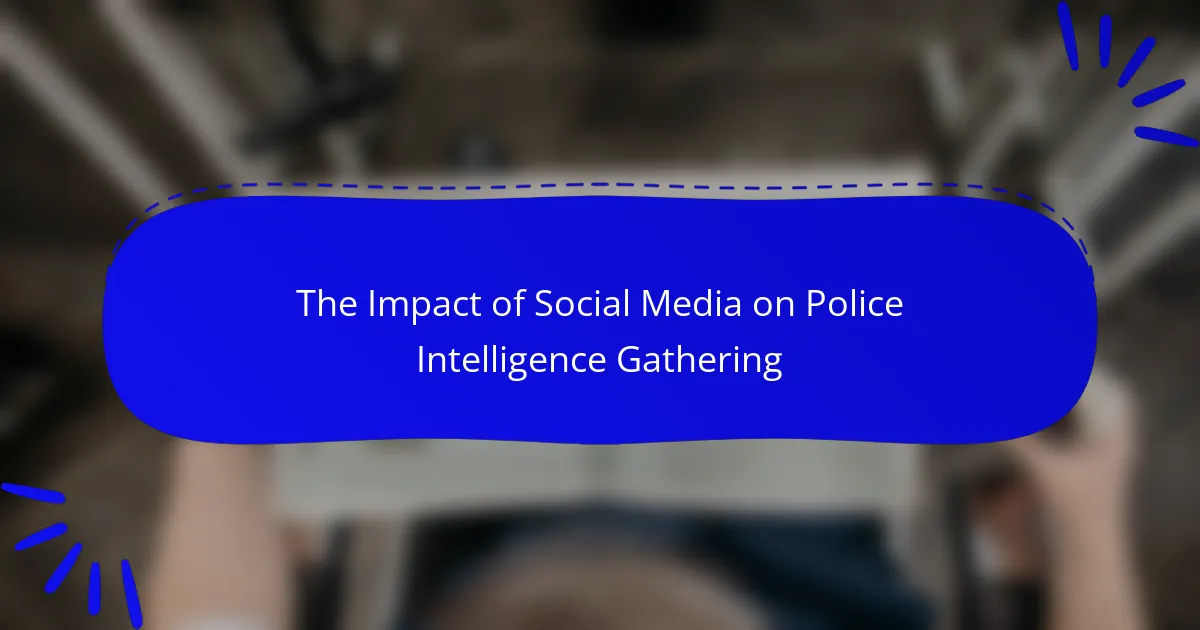
What is the Impact of Social Media on Police Intelligence Gathering?
Social media significantly enhances police intelligence gathering. It provides real-time access to vast amounts of publicly shared information. Police can monitor social media platforms for criminal activity and public safety threats. This includes identifying potential suspects through posts, photos, and videos.
Social media also aids in community engagement and information sharing. Police departments can use platforms to disseminate alerts and gather tips. According to a study by the International Association of Chiefs of Police, 80% of law enforcement agencies utilize social media for investigations.
Furthermore, social media analysis tools can help in trend identification and predictive policing. These tools analyze user behavior to forecast potential incidents. Overall, social media serves as a vital resource in modern policing strategies.
How has social media changed the landscape of police intelligence?
Social media has significantly transformed police intelligence by enhancing information gathering and community engagement. Police departments now utilize platforms like Twitter and Facebook to monitor public sentiment and gather real-time data. This shift allows for quicker responses to incidents and improved situational awareness.
Moreover, social media enables officers to disseminate information rapidly to the public, aiding in investigations. For instance, sharing photos or descriptions of suspects can lead to tips from the community. Studies show that 70% of law enforcement agencies use social media to engage with citizens and gather intelligence.
Additionally, social media analytics tools help police identify patterns and trends in criminal activity. This data-driven approach enhances proactive policing strategies. Overall, social media has become an essential tool for modern police intelligence operations.
What are the key features of social media that influence police intelligence?
Key features of social media that influence police intelligence include real-time information sharing, user-generated content, and data mining capabilities. Real-time information sharing allows police to receive immediate updates during incidents. User-generated content provides insights into public sentiment and potential criminal activity. Data mining capabilities enable law enforcement to analyze patterns and trends in criminal behavior. According to a study by the International Association of Chiefs of Police, over 70% of police agencies use social media for intelligence gathering. This highlights the significance of social media in enhancing situational awareness and decision-making for law enforcement.
How do police departments utilize social media for intelligence purposes?
Police departments utilize social media to gather intelligence by monitoring public posts and interactions. They analyze data to identify crime trends and hotspots. Social media platforms provide real-time information on events and community sentiments. Officers can engage with the public to solicit tips and gather leads. Departments use social media to disseminate information about ongoing investigations. They also track potential suspects and witness activity through online interactions. Research indicates that 70% of law enforcement agencies use social media for intelligence purposes. This approach enhances situational awareness and supports proactive policing strategies.
What are the advantages of using social media in police intelligence gathering?
Social media enhances police intelligence gathering by providing real-time information. It allows law enforcement to monitor public sentiment and trends. Police can identify potential threats through user-generated content. Social media platforms facilitate communication and collaboration with the community. They can gather tips and leads from the public quickly. Data analytics tools can analyze vast amounts of social media data efficiently. According to a study by the International Association of Chiefs of Police, 90% of officers believe social media improves their ability to gather intelligence. This demonstrates the significant role of social media in modern policing.
How does social media enhance community engagement for police?
Social media enhances community engagement for police by facilitating direct communication and interaction. It allows police departments to share information quickly with the public. This includes updates on crime trends, safety tips, and community events. Social media platforms enable two-way communication, allowing citizens to voice concerns and provide tips. Research shows that police departments using social media report higher community trust levels. A study by the International Association of Chiefs of Police found that 70% of officers believe social media improves community relations. Furthermore, social media can mobilize community support during emergencies, increasing public awareness and participation.
What types of intelligence can be gathered from social media platforms?
Social media platforms can provide various types of intelligence, including sentiment analysis, demographic insights, and network analysis. Sentiment analysis gauges public opinion on specific topics or events. This data helps law enforcement understand community feelings and potential unrest. Demographic insights reveal user characteristics such as age, gender, and location. This information aids in identifying trends and targeting specific populations. Network analysis examines relationships and interactions among users. It uncovers connections that may indicate criminal activity or emerging threats. Each type of intelligence contributes to a comprehensive understanding of social dynamics and public safety.

What challenges do police face when using social media for intelligence gathering?
Police face several challenges when using social media for intelligence gathering. One major challenge is the vast amount of data available online. This data can be overwhelming and difficult to process effectively. Another challenge is the issue of privacy and legal constraints. Police must navigate laws regarding surveillance and data collection. Additionally, misinformation and false accounts can complicate the accuracy of intelligence. Social media platforms often lack verification processes, leading to potential errors in information. Finally, the rapid pace of social media can hinder timely responses. Police may struggle to keep up with real-time developments and emerging threats.
How do privacy concerns affect police use of social media?
Privacy concerns significantly limit police use of social media. Law enforcement agencies must navigate legal restrictions related to data collection and user consent. These regulations often necessitate transparency about how data is used. Additionally, public backlash against perceived invasions of privacy can hinder police operations. For instance, studies show that communities are more likely to resist policing strategies perceived as intrusive. Balancing effective intelligence gathering with respect for individual privacy rights remains a critical challenge.
What are the legal implications of monitoring social media?
Monitoring social media can have significant legal implications. These implications primarily involve privacy rights and data protection laws. For instance, monitoring may infringe on individuals’ reasonable expectations of privacy. The Fourth Amendment protects against unreasonable searches and seizures in the United States. Additionally, the General Data Protection Regulation (GDPR) in Europe regulates the collection and processing of personal data. Violating these laws can lead to legal consequences, including lawsuits and fines. Courts have ruled on cases where unauthorized monitoring resulted in penalties. Organizations must ensure compliance with applicable laws to avoid legal risks.
How do misinformation and disinformation impact police intelligence?
Misinformation and disinformation severely undermine police intelligence. They create confusion and lead to incorrect conclusions. Police may act on false information, wasting resources and time. This can result in missed opportunities to apprehend suspects. A study by the RAND Corporation found that misinformation can escalate tensions in communities. Disinformation campaigns can also erode public trust in law enforcement. Trust is crucial for effective policing and community cooperation. When the public doubts police information, collaboration declines. This ultimately hinders crime prevention and resolution efforts.
What strategies can police employ to overcome challenges in social media intelligence?
Police can employ several strategies to overcome challenges in social media intelligence. First, they can enhance training for officers on social media tools and analytics. This training can improve their skills in monitoring and interpreting social media data. Second, collaboration with technology experts can help police leverage advanced analytics and AI tools. These tools can process large volumes of data efficiently. Third, establishing partnerships with social media platforms can facilitate better access to data. This access can aid in real-time intelligence gathering. Fourth, creating dedicated social media units within police departments can streamline efforts. These units can focus on specific cases and trends. Lastly, implementing community engagement initiatives can foster trust and encourage public cooperation. This trust can lead to more information being shared with law enforcement.
How can police improve their social media monitoring techniques?
Police can improve their social media monitoring techniques by adopting advanced analytics tools. These tools can process large volumes of data quickly. They enable real-time tracking of public sentiment and emerging trends. Enhanced algorithms can identify potential threats more effectively. Training officers in digital literacy is also crucial. This training ensures they understand the nuances of social media platforms. Collaboration with tech companies can provide access to cutting-edge monitoring software. Regularly updating monitoring strategies based on evolving social media trends is essential. Research indicates that agencies using these methods report increased situational awareness.
What best practices should police follow when engaging with social media data?
Police should follow several best practices when engaging with social media data. First, they must ensure compliance with legal standards and privacy regulations. This includes respecting users’ rights and obtaining necessary warrants when required. Second, police should verify the authenticity of information before acting on it. Misinformation can lead to wrongful actions or public distrust. Third, utilizing advanced analytics tools can enhance data interpretation. These tools can help identify trends and patterns effectively. Fourth, transparency with the community is crucial. Sharing insights about how social media data informs policing fosters trust. Finally, continuous training for officers on digital literacy is essential. This ensures they stay updated on evolving social media landscapes and technologies.

What future trends are expected in the use of social media for police intelligence gathering?
Future trends in the use of social media for police intelligence gathering include increased automation and AI integration. Law enforcement agencies are expected to utilize advanced algorithms for real-time data analysis. This will enhance the ability to identify threats and monitor public sentiment. Social media platforms will likely provide more robust data-sharing capabilities with law enforcement. Enhanced privacy regulations may also shape how data is accessed and utilized. Additionally, community engagement through social media will become a vital tool for intelligence gathering. The use of geolocation features in social media posts will aid in tracking criminal activity. Overall, these trends indicate a shift towards more proactive and data-driven policing strategies.
How might advancements in technology influence social media intelligence?
Advancements in technology significantly enhance social media intelligence. Improved algorithms enable faster data analysis from vast social media platforms. Machine learning tools can identify patterns and trends in user behavior. Enhanced data mining techniques extract valuable insights from user interactions. Real-time monitoring tools allow for immediate responses to emerging threats. Natural language processing improves sentiment analysis of public opinions. Advanced visualization tools present complex data in an understandable format. These technological improvements lead to more informed decision-making in police intelligence operations.
What role will artificial intelligence play in police social media strategies?
Artificial intelligence will enhance police social media strategies by improving data analysis and communication. AI can analyze vast amounts of social media data quickly. This enables law enforcement to identify trends and potential threats in real time. AI algorithms can also assist in sentiment analysis. This helps police understand public perceptions and reactions. Furthermore, AI can automate responses to common inquiries. This increases efficiency in communication with the community. Research indicates that AI tools can significantly reduce response times. For example, a study by the International Association of Chiefs of Police found that AI applications improved operational effectiveness in police departments.
How can police adapt to evolving social media platforms?
Police can adapt to evolving social media platforms by implementing advanced training programs. These programs should focus on digital literacy and social media trends. Officers need to understand how different platforms operate and their unique user demographics. Utilizing data analytics tools can help police track real-time information and public sentiment. Engaging with community members online fosters trust and improves communication. Collaborating with tech experts can enhance their ability to monitor and analyze social media content. Regularly updating policies to reflect new social media developments is essential. Successful adaptation has been demonstrated by departments that actively use social media for outreach and intelligence gathering.
What practical tips can police departments implement for effective social media intelligence gathering?
Police departments can implement several practical tips for effective social media intelligence gathering. First, they should establish a dedicated social media monitoring team. This team can track relevant hashtags and keywords related to local crime. Additionally, police departments should utilize advanced analytics tools to process large volumes of data efficiently. These tools can help identify trends and patterns in online conversations.
Training officers on social media use is crucial. Officers should understand the legal implications of monitoring online content. Engaging with the community through social media can also build trust. This engagement encourages the public to share information that may aid investigations.
Collaboration with social media platforms can enhance intelligence efforts. Platforms often provide resources and support for law enforcement agencies. Finally, maintaining a clear policy on data privacy and ethics is essential. This ensures that intelligence gathering respects citizens’ rights while being effective.
How can training enhance police effectiveness in social media intelligence?
Training can enhance police effectiveness in social media intelligence by improving analytical skills and operational strategies. Officers trained in social media analysis can identify trends and threats more efficiently. This training enables them to utilize tools for data collection and analysis. Enhanced skills lead to quicker decision-making in critical situations.
Research indicates that police departments with specialized social media training report increased case resolutions. For instance, a study by the Police Executive Research Forum found that trained officers are 30% more effective in gathering actionable intelligence from social media. This effectiveness stems from understanding platform dynamics and user behavior.
Overall, targeted training directly correlates with improved outcomes in police operations involving social media intelligence.
What collaborative efforts can be established between police and social media companies?
Police and social media companies can collaborate through information sharing. This involves police accessing data from social media platforms to aid investigations. Social media companies can provide insights on user behavior and trends. Joint training programs can be established to educate officers on digital forensics. Additionally, police can work with social media firms to develop protocols for reporting criminal activity. Regular meetings can facilitate ongoing communication between both entities. These collaborations enhance public safety and improve response times. Research shows that social media monitoring can lead to quicker identification of suspects.
The main entity of this article is the impact of social media on police intelligence gathering. The article examines how social media enhances police operations by providing real-time access to publicly shared information, facilitating community engagement, and aiding in the identification of crime trends. It discusses the key features of social media that influence intelligence gathering, the advantages and challenges faced by police in utilizing these platforms, and the legal implications of monitoring online content. Additionally, it explores future trends, the role of technology and artificial intelligence, and practical strategies for effective social media intelligence gathering in law enforcement.
